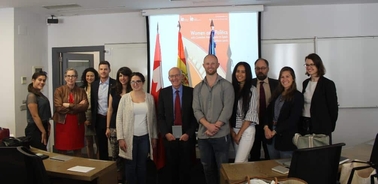- Home
- News And Events
- What’s Going On
- Canadian Ambassador Talks Gender Equality With Ie Women In Business
Canadian Ambassador talks gender equality with IE Women in Business

The IE Women in Business Club hosted Canadian Ambassador to Spain, Matthew Levin and Senior Trade Commissioner and Commercial Counsellor Karen Kennedy.
The Canadian Ambassador to Spain Matthew Levin and Senior Trade Commissioner and Commercial Counsellor for the Canadian Embassy Karen Kennedy visited IE Business School for a free-ranging conversation with students about the intersection between globalization, tariff agreements and diplomacy in the current environment.
The conference, organized by the IE Women in Business Class in collaboration with the IE Global Transformation Club sought to address how shifts in the global landscape will affect the evolution of work and business, paying special attention to international issues like gender equality, climate change and immigration.
“The last few years have been a period of discomfort,” Levin said. “Of course, there have been ebbs and flows in international affairs and bilateral relationships, but I think in the last few years, the discontinuity has been more profound and more systemic than ever.”
The ambassador described how he envisioned the transition from a traditional open market in the post-war period, to a global challenge of this paradigm with today’s new approach. Both Levin and Kennedy insisted on the fundamental role in modernizing the mechanisms of NAFTA for greater stabilization of trade and tax agreements in North-America. With what he called “a destabilized global discourse,” the ambassador highlighted how fostering international order is a key challenge for diplomatic institutions.
Levin pointed to how the Canadian government is increasingly committed to gender equality as an example of how international issues can spur change on some of the greater global problems emerging in recent years. Levin said issues like sustainability, diversity, equal employment opportunities and inclusion all are affected by the global challenge to the traditional order.
“Gender equality is a horizontal issue.”
“Gender equality is a horizontal issue. And the idea is that none of these issues are achievable if we don’t achieve gender equality first. We need to make sure we are approaching all these issues through the gender equality perspective,” he said.
Canada’s highest diplomat in Spain highlighted a current Canadian project—in collaboration with an NGO--designed to raise youth awareness on gender equality by sponsoring and promoting the conference “Women Deliver,” focused on women empowerment through the promotion of sexual reproductive health.
Kennedy described the evolution of trade agreements into new-generation procedures which are increasingly all-encompassing and inclusive of domestic policies. Moreover, she argued the embassy’s responsibilities include promoting investment and easing the intersection between industry and government through bridging tariff contracts that are beneficial for all parties.
Levin agreed.
“The reason why we are able to go so far in the agreement with the EU is because we basically share a whole set of values on how society should be.”
“The reason why we are able to go so far in the agreement with the EU is because we basically share a whole set of values on how society should be. Environmental values, commitment to labor standards, and many others. We can open ourselves up to that kind of competition, because it is going to be loyal,” commented Levin. “SIDA (Swedish International Development Cooperation Agency) will be a model for how trade agreements should look.”
Both underlined the importance of global cooperation to tackle issues, such as gender equality, as well as climate change, the immigration crisis and the demand for new talent, especially relevant in Canada.
“If the basic premise is that we all benefit from greater integration and the liberalization of these rules, then we start with a shared premise. But then if suddenly somebody doesn’t share that premise, there is an asymmetry in the economy,” Levin said. “We would be better off if we could determine the terms of this agreement in a unilateral way, and the mechanisms of the new economy forced this view on our trading parties. And if you see it with this view, it opens up a much more complex agreement making.”